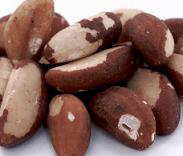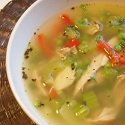Lose Weight
![]() Calories in Food
Calories in Food
![]() Calories in Nuts
Calories in Nuts
![]() Calories in Brazil Nuts
Calories in Brazil Nuts
Calories in Brazil Nuts and Nutrition Facts
How many calories in Brazil Nuts? See below, the Brazil Nuts calories for the different serving sizes. We provide you with Brazil Nuts nutrition facts and the health benefits of Brazil Nuts to help you lose weight and eat a healthy diet.
The Brazil Nut has one of the highest saturated fat (bad fat) content of all nuts, about a fifth, but is also full of both mono and poly unsaturated fats (good fats), half of the nut. The Brazil Nut is very high in vitamins and minerals: vitamin E, calcium, thiamin, magnesium, manganese, copper, phosphorus and even selenium, an important antioxidant.
Brazil Nuts are thought to help protect against many cancers including prostate, breast and colon cancer given its high selenium content. Other Brazil Nut benefits including boosting the immune system. Brazil Nuts are free from gluten.

It is considered that if you eat a portion of nuts (30 grams) about twice a week, it was reported in a journal called "Obesity", that you are less likely to gain weight than those who do not eat nuts.
See our nut calories comparison chart to compare calories in Brazil Nuts with the other calories in nuts.
Calories in Brazil Nuts, Dried, Unblanched
Refuse: 49% (Shells)Scientific Name: Bertholletia excelsa
| Serving Size | Calories per Serving |
| 100 grams | 656 kcal (2743 kJ) |
| 1 cup, whole, 133 grams | 872 kcal (3648 kJ) |
| 1 kernel, 5 grams | 33 kcal (137 kJ) |
| 1 oz (6 kernels), 28.35 grams | 186 kcal (778 kJ) |
Brazil Nuts Nutrition Facts
| Nutritional value per 100 g (3.5 oz) | |
|---|---|
| Proximates: | |
| Water | 3.48 g |
| Energy | 2743 kJ (656 kcal) |
| Protein | 14.32 g |
| Carbohydrates | 12.27 g |
| Sugars | 2.33 g |
| Total Fat: | 66.43 g |
| saturated fat | 15.137 g |
| monounsaturated fat | 24.548 g |
| polyunsaturated fat | 20.577 g |
| Cholesterol | 0 mg |
| Fiber | 7.5 g |
| Minerals: | |
| Calcium, Ca | 160 mg (16 %) |
| Iron, Fe | 2.43 mg (14 %) |
| Magnesium, Mg | 376 mg (94 %) |
| Phosphorus, P | 725 mg (73 %) |
| Potassium, K | 659 mg (14 %) |
| Zinc, Zn | 4.06 mg (27 %) |
| Copper, Cu | 1.743 mg (87 %) |
| Manganese, Mn | 1.223 mg (61 %) |
| Selenium, Se | 1917.0 mcg (2738 %) |
| Vitamins: | |
| Vitamin C | 0.7 mg (1.2 %) |
| Thiamine (Vit. B1) | 0.617 mg (41 %) |
| Riboflavin (Vit. B2) | 0.035 mg (2 %) |
| Niacin (Vit. B3) | 0.295 mg (1.5 %) |
| Pantothenic acid (B5) | 0.184 mg (2 %) |
| Vitamin B6 | 0.101 mg (5 %) |
| Folate (Vit. B9) | 22 mcg (6 %) |
| Vitamin B12 | 0.0 mcg (0 %) |
| Vitamin A | 0 IU (0 %) |
| Vitamin E | 5.73 mg (29 %) |
| Vitamin D | 0 IU (0 %) |
| Vitamin K | 0 mcg (0 %) |
| Percentages are relative to US Recommended Daily Intake (RDI) for adults. | |
Author: Lana Soko
You Might Also Like:
 |
 |
 |
 |
Like This Page?
|
Share This Page:
|
Search Our Site:

Free E-Book:
We Recommend:
Looking to get your body into great shape? Get the very best results for your efforts and money! Save your valuable time from surfing the internet. These are theBestselling Weight Loss Programs

Programs that work and have thousands of satisfied customers worldwide!

 |
